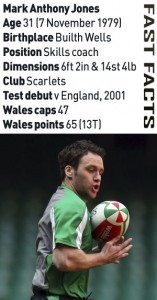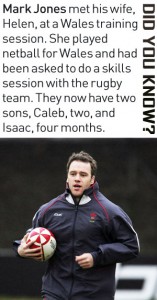 There have been a couple of occasions this season when Mark Jones has been tempted to leave his spot amongst the Scarlets coaches on the sidelines and run onto the pitch. An interception or a break down the wing is what most entices him towards the touchline. “I’ve been half in the motion of running onto the field,” jokes the former Wales wing.
There have been a couple of occasions this season when Mark Jones has been tempted to leave his spot amongst the Scarlets coaches on the sidelines and run onto the pitch. An interception or a break down the wing is what most entices him towards the touchline. “I’ve been half in the motion of running onto the field,” jokes the former Wales wing.
It was last August that Jones had to retire from the game, the latest in a long line of knee injuries forcing him to call time on his career or risk long-term damage. He says: “Funnily enough my wife asked me the other day if I miss playing. I said yes – but I don’t miss my knee swelling up and picking myself up from injuries and so on. I miss playing terribly and would love to get back playing again, but I can’t. “The surgeon said I needed to stop so it was taken out of my hands. I had 12 years so I didn’t want to be greedy – there’s a long life after rugby. I want to be able to kick a ball around with my kids.”
The number of professionals being forced to retire prematurely through injury is an ongoing concern, many fearing that players have become too big and too powerful for their own – and their opponents’ – good. Jones, however, believes rugby has self-regulated itself and a change in attitudes is seeing a move away from the ‘bigger is better’ view. “Physicality is part of the attraction of rugby – that’s why you start playing and, along with the skill, that’s why people watch,” he says. “Everybody loves to see a great tackle and the whole crowd gasp.
“The game is very physical but I think it’s plateaued. There’s been a huge development in the size of players in the last six or seven years, but now teams are looking to lighten players. The laws of the game are now more suited to that – the ball is in play more and the contact area now favours the attacking team. A lot of things have made it a more running-orientated game rather than the collision game of the past few seasons.”
With 47 Wales caps and over a decade on the wing at the Scarlets, Jones knows all about a running game. And now that he’s crossed the divide from player to coach to join Nigel Davies’s back-room team, he’s trying to impart his knowledge on the region’s youngsters. He took up the role of skills coach in the summer and says: “I’m enjoying it immensely. It’s obviously frustrating having to finish playing, but the next best thing is coaching. The coaches I’m working with are brilliant and it’s a great learning environment for me.
“There’s huge pressure to improve standards after last season, when we finished second from bottom in the league. There’s so much further we can grow, but we’re not a million miles away from things taking shape. I’ve been responsible for our attacking play this season, that’s fallen into my lap, and we’ve taken a lot of the structure out of the game. We now play what’s in front of us. It’s my role to upskill the players so they can do that.”
 Having only recently hung up his boots, Jones knows the importance of keeping players focused during training so that the key messages can be conveyed and he’s been impressed by the attitude of his charges, particularly the younger contingent. “Having just come out of the locker room, I know the conversations that happen after team meetings and matches, and how players are tired in certain situations. I’ve a clear idea of how players react to things and I want to keep them interested in what we’re doing.
Having only recently hung up his boots, Jones knows the importance of keeping players focused during training so that the key messages can be conveyed and he’s been impressed by the attitude of his charges, particularly the younger contingent. “Having just come out of the locker room, I know the conversations that happen after team meetings and matches, and how players are tired in certain situations. I’ve a clear idea of how players react to things and I want to keep them interested in what we’re doing.
“Running came easy to me, but I had to work hard on my passing, kicking and footballing ability. I’ve tried to get that across to the younger players and explained the type of things I tried to improve. There’s a great willingness to learn from the young guys and that helps me. They’re like sponges. They’re so keen to learn and are willing to accept help and advice to improve.”
One of those youngsters is George North, who made a rapid rise from schoolboy player to Wales international last autumn, scoring two tries on his Test debut against South Africa. The 18-year-old, who is out with a shoulder injury, has paid tribute to Jones, saying: “I feel lucky to be able to work with a coach like Mark Jones, who’s fresh from the game and has really helped me look at how I play in different ways as well as helping me gain confidence and belief.”
The modest Jones plays down his part in North’s progress, but believes the winger can become a key player for Wales. “As a wing I’ve been able to offer him an extra insight into that area, but I’ve only been working with him for a short period, so the people who’ve coached him before should take credit. He’s not afraid to speak up and challenge the coaches. That’s healthy – you don’t want to be autocratic.
“George can be exceptional. It’s all up to him now. He’s got the capability to go to the World Cup and if he gets certain parts of his game really polished, he can be a big asset for Wales, a real force.”
And that’s where Jones, the coach, comes in.
This article appeared in the February 2011 issue of Rugby World Magazine
Do you want to buy the issue of Rugby World in which this article appeared? Back Issues Contact John Denton Services at 01733-385-170 visit http://mags-uk.com/ipc
Or perhaps you’d like a digital version of the magazine delivered direct to your PC, MAC or Ipad? If so click here.







